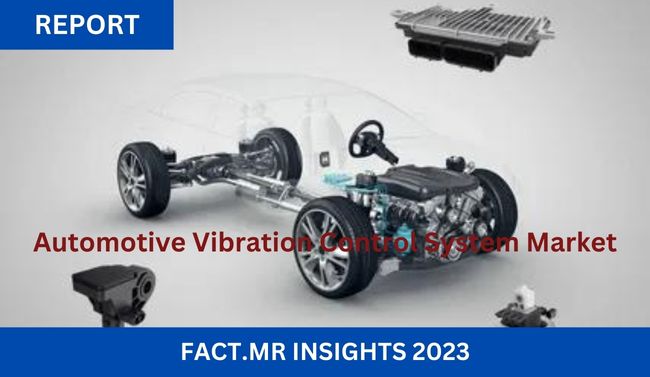The global automotive vibration control system market is valued at US$ 165.1 billion in 2022 and is expected to reach US$ 262.8 billion by 2032, growing at a CAGR of 4.8% from 2022 to 2032.
The automotive industry is constantly evolving, with a focus on enhancing vehicle performance, comfort, and safety. One critical aspect of this evolution is the integration of automotive vibration control systems. These systems play a pivotal role in ensuring a smooth and stable driving experience by minimizing vibrations and noise generated by various vehicle components.
Get Free Sample Copy of This Report-https://www.factmr.com/connectus/sample?flag=S&rep_id=7212
Automotive Vibration Control System Market Dynamics
Rising Demand for Comfort and Safety: Consumers are increasingly seeking vehicles that provide a comfortable and safe ride. Automotive vibration control systems help in achieving this by reducing the vibrations and noise generated by the engine, transmission, suspension, and other vehicle components. This is particularly important for high-end and luxury vehicle segments.
Stringent Regulatory Standards: Governments across the world are imposing stricter regulations related to vehicle noise and emissions. Automotive manufacturers are thus compelled to incorporate advanced vibration control systems to meet these standards. This trend is driving the demand for such systems in the automotive industry.
Innovations in Material and Technology: Advancements in materials and technology have enabled the development of more efficient and lightweight vibration control systems. These systems not only improve performance but also contribute to fuel efficiency, aligning with the global push for greener transportation solutions.
Increasing Vehicle Production: The global automotive industry is witnessing steady growth in vehicle production. As the number of vehicles on the road continues to rise, so does the demand for effective vibration control systems to ensure passenger comfort and vehicle durability.
Automotive Vibration Control System Market Current Issues and Challenges
- Cost Constraints: Implementing advanced vibration control systems can be costly, which poses a challenge for manufacturers, particularly in the mass-market segment. Striking a balance between cost-effectiveness and performance remains a challenge.
- Integration Complexity: Integrating vibration control systems into existing vehicle designs can be complex. Manufacturers must ensure that these systems do not interfere with other crucial components or systems in the vehicle.
- Durability and Reliability: Vibration control systems must be highly durable and reliable to withstand the harsh operating conditions of vehicles. Ensuring long-term performance without frequent maintenance is a challenge.
- Global Supply Chain Disruptions: The automotive industry has experienced disruptions in the global supply chain, affecting the availability of key components and materials required for vibration control systems.
Automotive Vibration Control System Market Value Chain
The value chain of the automotive vibration control system market consists of several key stages:
Research and Development (R&D): This phase involves the development of innovative vibration control technologies, materials, and solutions. Research institutions, automotive manufacturers, and specialized R&D firms play a crucial role here.
Component Manufacturers: Companies specializing in the production of vibration control components, such as dampers, isolators, and mounts, are integral to the value chain. They supply these components to automotive OEMs and Tier 1 suppliers.
Automotive OEMs: Original Equipment Manufacturers (OEMs) incorporate vibration control systems into their vehicle designs. They may produce their own systems or source them from Tier 1 suppliers.
Competitive Landscape
In the competitive landscape of the global automotive vibration control system market, several prominent players stand out, including Anand NVH Products, Bridgestone Corporation, ContiTech AG, and Corteco (Freudenberg), among others. These industry leaders are actively pursuing expansion strategies, capitalizing on emerging opportunities in burgeoning economies.
To bolster their presence, tier-1 automotive vibration control system manufacturers are strategically expanding their operations. This expansion encompasses the establishment of research and development facilities, new manufacturing plants, and the development of robust distribution and sales networks across diverse regions. These moves not only aim to secure a substantial market share but also to navigate trade complexities, mitigate import-export expenses, and tap into cost-effective labor pools.
While East Asia currently boasts highly efficient manufacturing facilities, South Asia & Oceania are emerging as potential manufacturing hubs in the near future. The geographical diversification of manufacturers is poised to extend the reach of their products to a wider customer base, facilitating rapid market penetration.
Fact.MR’s recent report offers comprehensive insights into the automotive vibration control system market. It encompasses crucial details such as pricing strategies adopted by top manufacturers across different regions, their sales growth trajectories, production capacities, and prospective technological advancements. These insights provide a holistic view of the market dynamics, aiding industry stakeholders in making informed decisions and staying competitive in the ever-evolving automotive vibration control system market.
Get Customization on this Report for Specific Research Solutions –https://www.factmr.com/connectus/sample?flag=RC&rep_id=7212
The automotive vibration control system market is driven by the growing demand for vehicle comfort and safety, stricter regulatory standards, and advancements in materials and technology. While challenges like cost constraints and integration complexity exist, the market continues to evolve as manufacturers seek innovative solutions to meet customer demands and regulatory requirements. The value chain is a complex network involving research, manufacturing, distribution, and service providers, all working together to enhance the driving experience and vehicle performance.
About Fact.MR:
Fact.MR is a distinguished market research company renowned for its comprehensive market reports and invaluable business insights. As a prominent player in business intelligence, we delivers deep analysis, uncovering market trends, growth paths, and competitive landscapes. Renowned for its commitment to accuracy and reliability, we empowers businesses with crucial data and strategic recommendations, facilitating informed decision-making and enhancing market positioning. With its unwavering dedication to providing reliable market intelligence, FACT.MR continues to assist companies in navigating dynamic market challenges with confidence and achieving long-term success. With a global presence and a team of experienced analysts, FACT.MR ensures its clients receive actionable insights to capitalize on emerging opportunities and stay ahead in the competitive landscape.
Contact:
US Sales Office
11140 Rockville Pike
Suite 400
Rockville, MD 20852
United States
Tel: +1 (628) 251-1583, +353-1-4434-232
Email: sales@factmr.com
